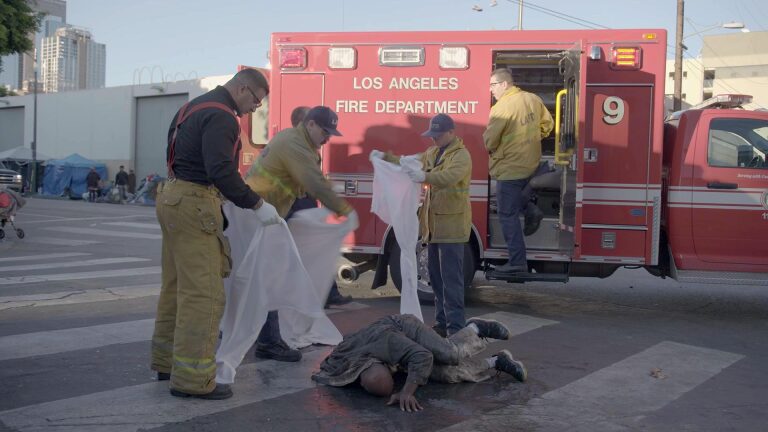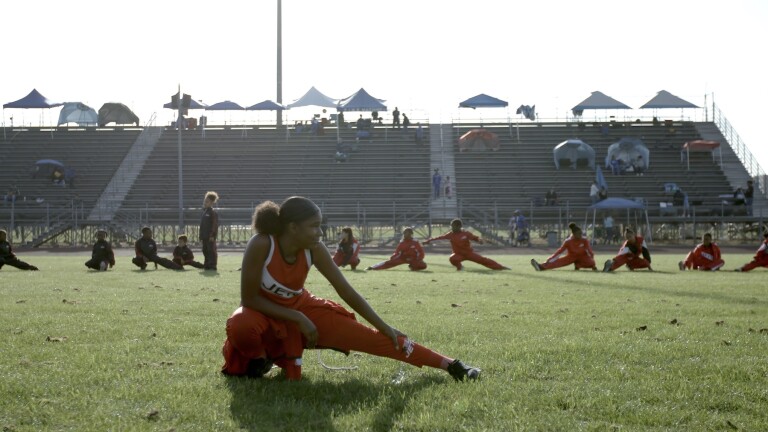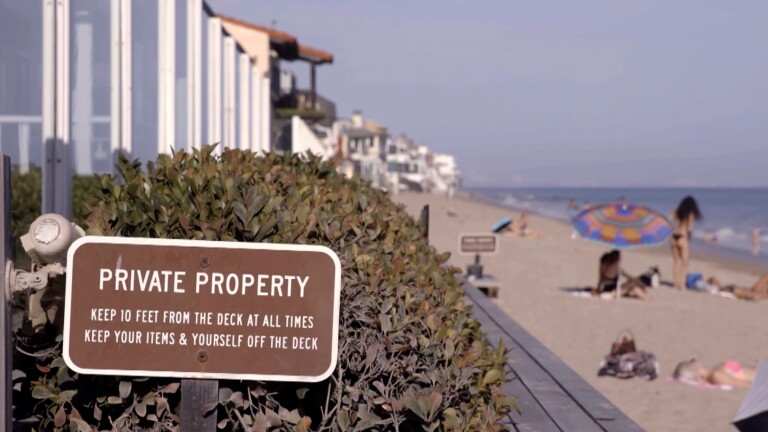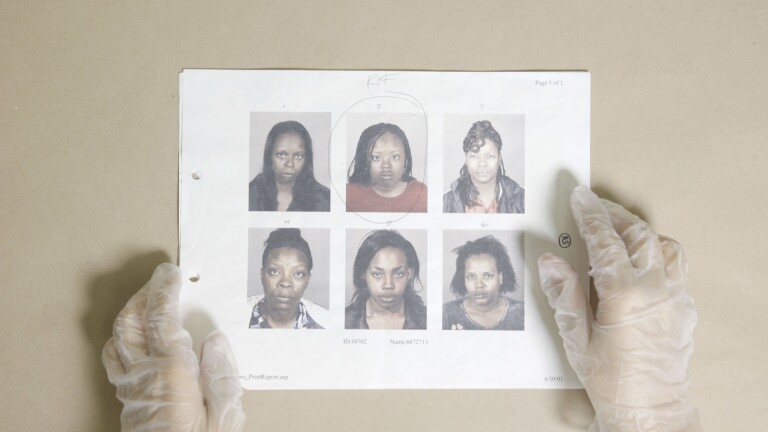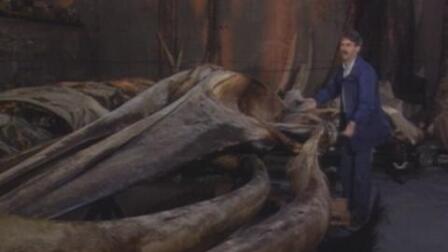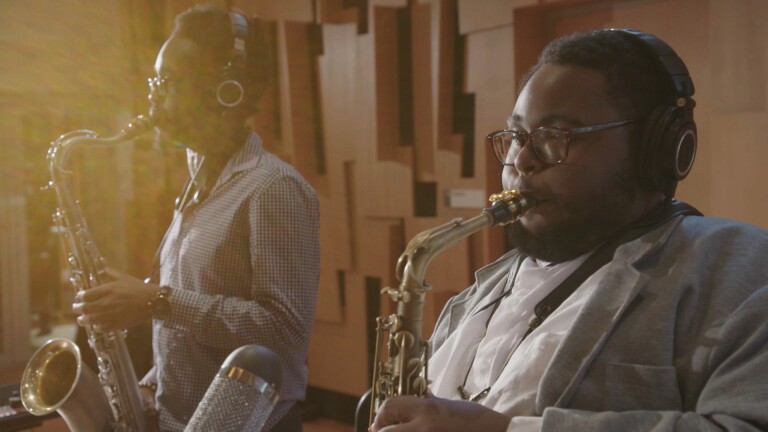
Crisis of Confidence
TRANSCRIPT:
Val Zavala: Something is changing in America. You can see it from the streets to the boardrooms. It's all about a growing frustration with the economy. The battle cry in the streets is "Banks got bailed out. We got sold out." But CEOs are angry too, and some are pledging to withhold donations to politicians. Everyone agrees we're in a crisis of confidence. Correspondent Jennifer London talks to both sides and asks if there is a way out of this economic logjam.
[Lennon song: Power to the People. Sounds of protesters.]
Jennifer London: The first tents popped up in New York. Then Angelenos staked their own claim.
[Crowd chanting "Power to the people."]
London: At first they were dismissed as "kooks." But in the last several weeks, the movement known as "Occupy Wall Street," and now "Occupy L.A." is spreading to hundreds of cities around the world. Their message isn't defined, but it's loud. They're fed up, angry and looking for change.
Danny Glover/Actor [speaking to crowd]: "We will not accept anything less than a change, a real change, a change for the future."
[Crowd chanting "This is what democracy looks like."]
London: They call themselves the 99 percent of Americans who are struggling with the economy — employed and unemployed, all ages, all walks of life.
Here in L.A., as in New York and other cities, the occupiers are venting emotions they say have been brewing for a long time. For too long, they say, there has been a huge disconnect between average Americans — the 99 percent — and big business and politicians. And while the protesters' demands aren't entirely clear, their message is: Washington is broken, and it's not capable of fixing itself.
And likely won't be fixed, protesters say, until what they call an unholy alliance between politicians and corporations is severed. The irony is that one of the country's most successful CEOs agrees.
Howard Schultz/CEO Starbucks: And this is no longer a crisis. It's an emergency. And I think we have to understand there have been many, many moments in the history of America where government and other people underestimated the power of the people.
London: That's Starbucks CEO Howard Schultz on a nationwide conference call of more than 120,000 people equally fed up. Like the occupiers, Schultz staged his own form of protest with this much-publicized letter that spells out his frustration with Washington's partisan politics and a lack of jobs.
It rallied thousands of CEOs to take a two-part pledge called "Upward Spiral." The promise — to stop political donations and start hiring. Some Los Angeles companies signed on.
Todd Morgan, CEO and Chairman of Bel Air Investment Advisors took the pledge.
Todd Morgan: I think there is a crisis of confidence in the investment world.
London: As did Blair Taylor, CEO of the non-profit, Los Angeles Urban League.
Blair Taylor: You cannot disenfranchise people in a permanent or semi-permanent way and expect anything but horrible outcomes on the back end.
London: Back at City Hall, the occupiers are having the same conversation.
Tiffany Tabares: I have four children, five grandchildren. And I'm afraid of what their future looks like.
Hanley Bonynge: For the first time in my life, I look to the future — and a house, a job, a family, that kind of thing — and I don't know if that is even a possibility. It's definitely not a certainty.
London: Hanley Bonynge was laid off in the finance industry three years ago, and has been temping while job hunting. He makes a point of protesting in his suit.
Bonynge: A lot of us have lost those jobs. And the ones that have jobs are barely making it. And that's not what the American Dream is supposed to be about. It's different for everybody. But the opportunity is supposed to be there and it's not there anymore.
London: There's no telling when those jobs will come back, if ever. Here's why: the challenge of implementing the Greek debt deal, plus a volatile U.S. stock market, plus a lack of consumer spending, equals a lot of scared investors.
Dr. Roger Farmer/Dean, Dept. of Economics, UCLA: For the last 30, 40 years we've been teaching a paradigm to our graduate students in which confidence has no role. We need to think about how confidence is important, why it's important, and how it influences employment.
UCLA Economist Roger Farmer has studied the relationship between confidence and unemployment.
Farmer: American companies right now are sitting on upwards of $2 trillion in cash. And that cash could be spent creating jobs.
London [to Farmer]:How come they're not creating jobs, then?
Farmer: The reason they're not creating jobs is because to do that, they need to invest in factories and machines. And the value of those factories and machines is extremely uncertain. If, in the future, people don't keep buying, then the profits that should be generated by that capital won't be coming in. And if that's not coming in, then the original investments will make a loss. It's confidence.
London: To understand the critical role of confidence, look no further than the unemployed. With the average length of unemployment at a new 60-year high — more than 40 weeks — the economic and emotional toll is deep, as we heard at this recent West Hollywood job fair.
Andrew Mccarthy: Some mornings are really tough, and I have to convince myself to put my feet on the floor, and get up, and do something. Because it's a long haul, two years with no job.
Christian Wright: Psychologically it wears on you. I mean, it literally wears on you.
Blair Taylor: At some point, you become part of the problem, as opposed to part of the solution. At some point, if I'm hoarding cash in a crisis like this, as opposed to spending some of it, if you don't do that it becomes a self-fulfilling prophecy. Our GDP is based primarily, and the largest component, is consumer spending.
London: This crisis of confidence has gripped the country on many levels. In the 11 recessions since World War II, middle class Americans could turn to their assets for extra cash. If house values were low, people could make money off their stocks. When the stock market fell, people could turn their homes into ATM machines. But when both plummet,there's nowhere to turn. Then spending takes a dive too.
If people stop spending, demand goes down. When demand goes down, profit loss and fear seize companies. Jobs are lost, creating less spending and more fear all the way around.
Farmer: In my view, confidence is an independent, fundamental factor that drives the economy, not always for the better. The fear that's engineered by the unemployed is perfectly rational. I mean, to lose your job in an economy where there's no prospect of finding another one for a long period of time is a dreadful, dreadful thing.
London: But can boots on the ground and suits in the boardroom force a seismic change and bring back confidence?
Shultz: We have to recognize our responsibility, as business leaders, to also lead in America today and not wait for Washington, and not allow Washington to define our history.
London: Part one of Schultz' "Upward Spiral" initiative is to stop political donations.
Blair Taylor: And what it really says is let's stop feeding the beast until the beast begins to do what it's supposed to do. Let's stop giving donations to Congress people until Congress focuses in on solving the issues that are in front of it and the issues which face America.
Todd Morgan: That will create more jobs by pushing Congress to come up with more ideas and ways to incentivize business people. And not all businesses are good enough that they can hire more people. My guess is most can't do both. Most people can do the first, it's easy to stop giving a political donation.
(Graphic of New York Times/CBS News Poll)
Congress' Job Approval Rating
Yes - 9%
No - 84%
Don't know - 7%
Margin of error +- 2%
London:It's a pledge Americans would likely get behind. According to a recent national poll, only 9 percent approve of the job congress is doing — an all-time low. And when we asked our L.A.-area CEOs about part two of the initiative,which is the promise to hire,they say there are still economic realities they face.
Taylor: I can tell you what my perspective is. I live, eat, and breathe this stuff every single day. The location where you are at is in the heart of South Central. This is where we are. I work in this place everyday. I get people to every job that we can get them to. We hire everybody we can possibly hire here at the Urban League.
London: When you say that I am committing to help get the economy going by adding jobs, what does that actually look like? What is the next step? You've taken in the pledge, now what?
Morgan: Well, as I said, if you make a commitment that you're not going to give any money until some resolution happens in Washington, and in addition, we are trying to add five percent more jobs at Bel Air Investment Advisors. From the last couple of months going 'til the end of the year, we are looking to do it. We can only help by hiring a few more people. But there is a lot of leverage in what they decide in Washington.
London: As for Starbucks CEO Howard Schultz, We reached out to him multiple times. But he was not available for an interview and did not respond to our written questions.
London [speaking to Taylor]: Do you think Upward Spiral is more of a symbolic gesture? Or do you actually think it has some teeth and can make a difference?
Taylor: I hope it has teeth. I hope it's more than symbolic.
Morgan: It can't be the only solution. It's an incentive, if enough people join to get Washington to come up with solutions and answers, for the two areas I just mentioned — both jobs and reducing the deficit.
Taylor: So it's a fair question. But I would argue the hopelessness now is so high we have to try something. Innovation isn't about always succeeding. What I don't know is if you try A, B, C or D, will that get us out of the tailspin necessarily? Don't know. But my argument remains: it is worth the shot. We must take the shot.
London: The occupiers are taking their own shot, and drawing strength from their basic strategy: stay put, grow the movement, and be heard.
Prof. Randi Picarelli/Cal State Northridge: This is going to be an ongoing thing. This is going to be about legislation changes, this is going to be about ending wars, bringing jobs back. And that's not going to happen immediately. So everybody out here needs to be aware of that, needs to be mindful of what success will look like, and be in it for the long haul.
Tiffany Tabares: If we take our time to let our voice get bigger and bigger and bigger, when we finally do present our demands, it will be a whole bunch of people presenting their demands, not just one small group in New York.
London: Whether populist sit-ins, CEO promises, or political action will rev up the economy's engine remains to be seen. But there is a consensus on what the key is: something bold needs to happen, and it needs to happen now.
Blair Taylor: That's like back to the movie Titanic, when the ship was bobbing around before it went down, right? You have those moments, and they may last a year or two or three or five, but eventually that thing is going down. And, I think if we can reconcile ourselves to that, not out of fear, not to be motivated purely by fear, but to be motivated by "That represents an opportunity for us as a country to come together and figure out how to move this forward."
Sgt. Joshua Wright/U.S. Army, Iraq War Veteran: Seeing the people rising up and saying, "It's time to take our country back," has made me more proud of being an American and of my country and my fellow citizens than almost anything I did in my time in the military.

